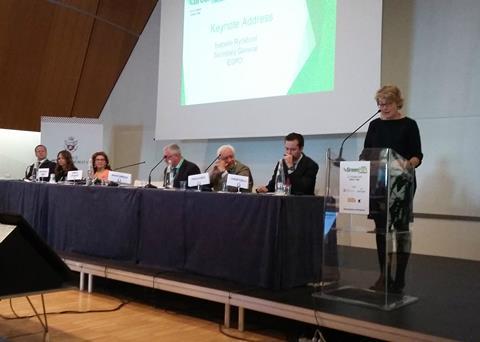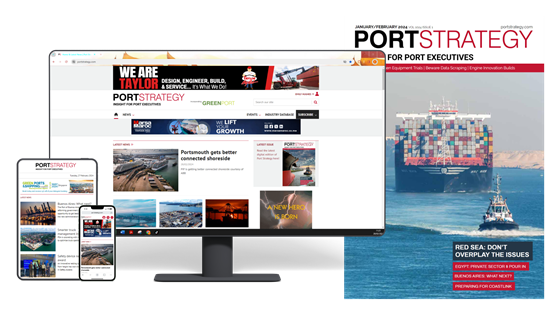One size doesn’t fit all when it comes to green business strategy, that was the overarching theme of the first day of this year’s GreenPort Congress hosted by the Venice Port Authority.

It’s something that we have heard time and time again at the conference, but each year something different crops up to demonstrate why a uniform approach to regulation and policy is nearly impossible to implement across the global ports sector.
One thing that should be standard though, said Brian Simpson, European Coordinator for the Motorways of the Sea in his keynote speech, is that the environment should be at the forefront of business strategy.
And, said Isabelle Ryckbost, Secretary General, European Sea Port Organization (ESPO), climate change should be top of the agenda of ports.
But of course as always, there is a need for a balanced approach between societal and environmental expectations and economic investment.
Alternative fuels
Session one of the Congress looked at port infrastructure with a heavy focus on LNG.
Questions from the floor focused on the concerns about LNG’s viability as an alternative fuel.
The question was asked why we are investing in LNG as a fossil fuel for ships that will be built for even lower emissions targets in the future? Jarek Kotowski from INEA said that there are other options aside from LNG to include methanol, nuclear and wind power. But there are no easy answers. In the next couple of decades he believes that we'll still be dependent on fossil fuels so LNG is a good option to meet emissions targets for now.
Another concern was over the expense of LNG infrastructure, even if a port manages to secure additional funding for any LNG investment, making it unfeasible for many ports.
Climate change
Session two after lunch was all about dealing with climate change.
First up on the agenda was an 'Introduction to the outcome of the Paris Agreement, December 2015' by Jan Brooke, Focal point for PIANC’s Think Climate coalition.
The Paris agreement will come into effect in November and requires action to mitigate green house gas emissions. PIANC's Think Climate coalition is a group of international organisations working together to try and harmonise carbon accounting across the sector.
Jan Brooke said:"We need to improve resilience. Climate change will affect both new and existing port infrastructure. The Paris agreement is a wake-up call, everyone has to do their bit to reduce emissions, ports are vulnerable".
Charles Haine, Technical Director, Lead for Maritime, Ports & Logistics Sector, Environment, WSP-Parsons Brinckerhoff, talked about climate change mitigation and adaptation.
He said that we should be thinking about the layouts and design of ports with regards to future proofing and be focusing more on joined up thinking.
"The port authority in future will have to supply GHG data to their tenants. Climate change adaptation should be high on the agenda but there is no one size fits all,” he said.
It is worth noting though that everyone can do their bit. One small change to one small component of the design of port infrastructure can save thousands of tonnes of carbon.
Port development
Session three focused on sustainable port development and maximising potential.
A talk on 'Shore-to-ship Power for LNG-to-Power' by Luca Imperiali, Global Application Technology Manager, ABB, made clear that "Shore to ship power is one of many tools that can be used to improve efficiency and the green footprint of a port" but it’s by no means a solution for everyone.
But perhaps electrification of equipment is more attainable for some.
Lorene Grandidier, Group Marketing and Business Development Manager, Cavotec, said that electrification brings clear benefits in emissions reduction and compliance with regulations. Latest innovations in electrification can make a port more efficient and safer.
Incentive schemes
The last session of the day focused on port incentive schemes which attracted a certain amount of sceptism.
Alessandro Pititto said: "Most environmental charging schemes in Europe work as rebates on port dues but there is a widespread belief that charging schemes are a weak incentive to make shippers go greener.”
Why? Maybe the stakes are a bit low or maybe no one has a clear idea of the extent to which a charging scheme may benefit the environment he said.
What is the alternative? There is no universal answer but one thing for sure is that ports need to use analyse and use their own data to find out.
Which brings us neatly back round to the fundamental problem with a one size fits all approach. No one knows better about a port’s own operations than the port itself.
The overwhelming opinion from day one at the Congress was that the ports industry just needs to get better at taking a more proactive and joined up approach to tackling emissions.
As more stakeholders are waking up to their own green responsibilities, taking the right environmental approach will become even more fundamental in helping the ports industry to compete and attract new business in an ever more competitive world.







